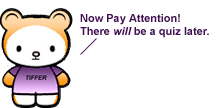
![]()
Social media: Tiffany Grant Fan Club on Facebook
Birthday/Sign: October 11 ~ Libra/Monkey
Hire Tiffany for your project today! Just click here to invite her to your audition:Voices.comPlease direct all written correspondence to:
Tiffany Grant
PO Box 213
Hampton, GA 30228-0213
USA
Tiffany enjoys attending conventions, and she only has four states to go in order to achieve her goal of attending a con in all 50 states! Wish list:Rhode Island, Wyoming, Montana, Delaware
If you'd like to contact Tiffany about attending your convention (In any state!), please email her here:Asukatoo@aol.comUPCOMING CONS (as of 09/12/2025):
ThunderCon ~ Sept. 13, 2025 (Tifton, GA)
Charleston Anime-Fest ~ Oct. 5, 2025 (N. Charleston, SC)
Anime Fusion ~ Oct. 17-19, 2025 (Minneapolis, MN)
Montana Anime-Fest ~ Nov. 2, 2025 (Billings, MT)
Montréal Anime-Fest ~ Nov. 22, 2025 (Québec, CA)
Columbia Anime Fest ~ Dec. 28, 2025 (Columbia, SC)
IMPORTANT LINKS:
eBay
YouTube Channel
Cameo
FREQUENTLY ASKED QUESTONS:
1: Are you yourself an otaku, or is animé strictly buisness?
Yes, I am definitely an anime fan, and I am thrilled to be a part of this great industry.
2: What are your top 10 favorite anime titles?Hmmm... My top ten. Well, I will list them, but in no particuar order - except Eva. That's still my fave.
1) Evangelion
2) Parasyte -the Maxim-
3) Den-noh Coil
4) Excel Saga
5) Fullmetal Alchemist
6) Spirited Away
7) Azumanga Diaoh
8) Noir
9) Wandaba Style
10) GodannarNOTE: This list changes frequently as I find new shows I like.
3: Do you actually talk the way you do when you act, or is it like you have an acting voice and then your normal voice kind of thing?
Well, the character that is closest to my normal voice would probably be Becky Farra from Gun Smith Cats. Of my approximately 1600+ credits - and God only know how many characters - I have played a pretty wide variety of roles. I have played authority figures, vixens, feisty teenagers, children (boys mostly), warriors (one had a French accent), an old lady and even a tree! So, my answer would be that I have done many, many voices and people DO usually recognize my voice at conventions ;-)
4: Do you ever hang out with other voice actors and, if so, who are your voice acting buddies?
Although we normally record our sessions indivually, I am good friends with many of the other voice actors. In fact, I know several of them from outside of voice acting. Some of my friends are Monica Rial, Kira Vincent-Davis, Allison Keith, Spike Spencer, Andy McAvin, Jay Hickman, Hilary Haag, Jason Douglas, Brett Weaver, Randy Sparks, Amy Howard, Lisa Ortiz, Rachael Lillis, Juliet Cesario, Scott Simpson, Michael Brady, Kelly Manison, Chris Patton, Greg Ayres, Laura Chapman and several others. I am also accquainted with many more and I have had the pleasure of meeting one of my personal idols twice, Peter Fernandez (Speed Racer), as well as Corinne Orr (Trixie).
5: Who is your favorite anime character that you did not voice?
Wow, that IS a hard one! I really like Ryo Hayakawa in Princess Nine, but I also LOVED Kabapu in Excel Saga. There are so many I like though, it's hard to pick just one.
6. I was wondering if there are any prerequisites for getting a job as a voice actor?
While there are no "prerequisites" per se when it comes to acting, there are things you can to work toward your goal. Voice acting is, first and foremost, acting. Many people have said to me "I'm too shy to be in a play or on-camera, but I think I'd be really good at voice acting." Wrong. Acting is about shedding your inhibitions, following your heart and being able to take a LOT of rejection. I recommend getting as much training and experience in whatever venues are available to you. Usually this means local theatre either through school or community groups. Other valid avenues are acting classes, working in independent films and doing your own projects online. The most important thing to realize is that, in order to work in a chosen field, you have to live where that work is happening. If you live in Kansas and have dreams of making it on Broadway, you won't get far. In the US, there are very few places that record voices for anime: Houston and Dallas in Texas, Los Angeles and a small amount in NYC. There are also many other fields for voice work: video games, audio books, toys and a myriad of things online. You might also consider voice-overs for radio and TV ads or educational films.
7: Do US licensors like Sentai buy the rights from a Japanese company to dub the anime, and is it really like 'first come, first served' or do you just watch some and pick which ones you want to do?
First of all, I am an actor and writer on a contract basis and am not directly employed by Sentai, FUNimation or any other studio. The folks working on US distribution of anime have been at the game for quite some time now. In fact, US companies like Sentai are often on the ground floor of many projects as a co-producer. This means that, many times, US companies already have the rights to a show by virtue of the fact that they helped finance it. Other times, Japanese companies approach US licensors and set up a partnership for distribution. Often, US anime execs are looking at storyboards and/or rough animation way before a show is done to decide whether or not they will license something for foreign distribution (outside Japan). That means it's pretty common for a show to run on TV in Japan that's already licensed by someone for English language distribution - even though the agreement may not have been publicly announced. To further illustrate this connection, I would point out that it's now not unusual for a US anime company to do simulcasts so that Japanese and US audiences watch the show at the same time.
8: I was wondering if you or the other actors have any control over what anime titles Sentai, FUNimtion, etc. chooses to license?
No, I'm afraid voice actors and writers don't have any say over what shows are licensed. And as for me personally, I don't even know what the options would be since I am pretty much clueless about what shows are on-air or in production. There are few things I know about such as sequels to shows I've worked on that I would love to have the chance to do, but those are merely wishes. I try not to get too caught up on what's going on in Japan or what's popular over there, because there's no guarantee I'll get to work on it, and I would hate to get my hopes up.
9: There is this awesome show that I think would be popular over here, do you know if any US company will license it?
Trust me, the US distributors are quite aware of all the shows that are out there. In fact, many TV shows on the air in Japan are already licensed for foreign distribution before they even go on television there. In fact, many shows distributed in the US are bought into by investing in the production as a co-sponsor (which is why their name is sometimes in the credits as a production partner). Some people make the assumption that because a show has not yet been announced by a US company, that it has not been licensed, but that's not necessarily the case. Sometimes, US companies have to wait a certain period of time (whatever the terms are in the contract) before announcing US rights for a particular show. In Japan, DVDs & Blu-Rays are very expensive, and there is a HUGE market for Japanese animé fans buying imported American DVDs/BDs!! That's because they are so much cheaper. Therefore, the original Japanese companies often want to allow some time for them to make money off the original release first.
10: There's a show that was just announced, and I'd like to see about flying there to audition for it. What are the chances?
The problem would be that you could easily spend more money on flights, hotels and rental cars as you would make recording the show, even if you got a large role. If it was a smaller role, you'd almost definitely lose money. Naturally, there can be situations where an actor is needed for a pickup on short notice, and you normally get paid very little for those. There have been times when actors have had to drive over 500 miles round trip between Houston and Dallas to do pick-ups for a show. If you accept a role in a project though, you have to agree to the terms and conditions. Things like pick-ups and getting called on short notice are a normal part of the job
11: I know you write scripts for dubbing. What does that job entail? Do you speak Japanese?
I cannot translate Japanese. Expert translators work on the shows, and sometimes there are two people reviewing the scripts. They work from the original Japanese script as well as listen to the dialogue track on the show. The ADR writers (like myself) face the basic task of adapting that translation into something that sounds good in English and suits each individual character while retaining the original intent AND keeping within the number of mouthflaps. That's the easier part. The difficult part is puns and cultural references. Those are HARD to convey, but essential to the process. We must also make note of all those little sounds you hear - the gasps, screams, running sounds, and other non-dialogue utterances. All these "exertions" and reactions have to be in the script so the director can be sure the actor records all of them in the booth. We are also responsible for noting the timecodes at which the dialogue and vocalizations are spoken. I always watch the entire series (I've only worked on shows with a max of 48 episodes) before writing a single word so I know all the hidden secrets and revelations that inevitably come out toward the end. In other words, although it may not get revealed that a certain character is really another person's mom or really in love with another character until episode 22, those actors need to know that information from the start to convey their performance adequately. Of course, to do the actual writing, you must watch the individual lines over and over and over to make sure the line on your script can actually be performed by the actor in that amount of time. Therefore, the writer has to act out every line of the script multiple times. This is where I get to do impersonations of all my fellow voice actors!
OFF-SITE INTERVIEWS:
Watch Tiffany Grant & Yuko Miyamura draw Asuka!
That Little Red-Haired Girl
[This was an extra on the Eva/Platinum DVD release in 2004]
Interviews:
Interview #1
Interview #2
Interview #3
Interview #4
Interview #5
Interview #6
Interview #7
Interview #8
Interview #9
Con Panels:
Con Panel #1
Con Panel #2
Con Panel #3
MISC INFO:Check out Voices for Peace, a non-profit project I'm a part of. It's an album of war protest songs both modern and classic. All profits from the album will be donated to CARE and Doctors Without Borders.




